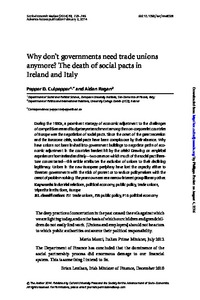Why don't governments need trade unions anymore? The death of social pacts in Ireland and Italy

Culpepper, Pepper D. ; Regan, Aidan
2014
12
4
Oct.
723-745
economic policy ; government attitude ; labour relations ; social dialogue ; trade union role ; tripartite
Labour relations
http://dx.doi.org/10.1093/ser/mwt028
English
Bibliogr.
"During the 1990s, a prominent strategy of economic adjustment to the challenges of competitiveness and budgetary retrenchment among the non-corporatist countries of Europe was the negotiation of social pacts. Since the onset of the great recession and the Eurozone crisis, social pacts have been conspicuous by their absence. Why have unions not been invited into government buildings to negotiate paths of economic adjustment in the countries hardest hit by the crisis? Drawing on empirical experiences from Ireland and Italy—two cases on which much of the social pact literature concentrated—this article attributes the exclusion of unions to their declining legitimacy. Unions in the new European periphery have lost the capacity either to threaten governments with the stick of protest or to seduce policymakers with the carrot of problem-solving. They are now seen as a narrow interest group like any other."
Digital
The ETUI is co-funded by the European Union. Views and opinions expressed are however those of the author(s) only and do not necessarily reflect those of the European Union or the ETUI.